
- Afhalen na 1 uur in een winkel met voorraad
- Gratis thuislevering in België vanaf € 30
- Ruim aanbod met 7 miljoen producten
- Afhalen na 1 uur in een winkel met voorraad
- Gratis thuislevering in België vanaf € 30
- Ruim aanbod met 7 miljoen producten
Zoeken
Evidence-Based Practice in School Mental Health
Addressing DSM-5 Disorders in Schools
€ 104,95
+ 209 punten
Omschrijving
Though schools have become the default mental health providers for children and adolescents, they are poorly equipped to meet the mental health needs of their students. Evidence-Based Practice in School Mental Health differs from other books that address child and adolescent psychopathology by focusing on how to help students with mental disorders in pre-K-12th-grade schools. Chapters address the prevalence of a disorder in school-age populations, appropriate diagnostic criteria, differential diagnosis, comorbid disorders, available rapid assessment instruments, school-based interventions using multi-tiered systems of support, and easy-to-follow suggestions for progress monitoring. Additionally, the text shares detailed suggestions for how school-based clinicians can collaborate with teachers, parents, and community providers to address the needs of youth with mental health problems. Each chapter finishes with extensive web resources and real-life case examples drawn from the author's clinical practice. This book serves as a helpful resource for school-based mental health providers (e.g., school social workers, school psychologists, and school counselors), communities-in-schools coordinators, and MSW students focusing on child and adolescent mental health.
Specificaties
Betrokkenen
- Uitgeverij:
Inhoud
- Aantal bladzijden:
- 480
- Taal:
- Engels
- Reeks:
Eigenschappen
- Productcode (EAN):
- 9780190886578
- Verschijningsdatum:
- 16/04/2019
- Uitvoering:
- Paperback
- Formaat:
- Trade paperback (VS)
- Afmetingen:
- 155 mm x 231 mm
- Gewicht:
- 793 g

Alleen bij Standaard Boekhandel
+ 209 punten op je klantenkaart van Standaard Boekhandel
Beoordelingen
We publiceren alleen reviews die voldoen aan de voorwaarden voor reviews. Bekijk onze voorwaarden voor reviews.










